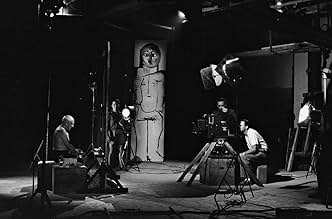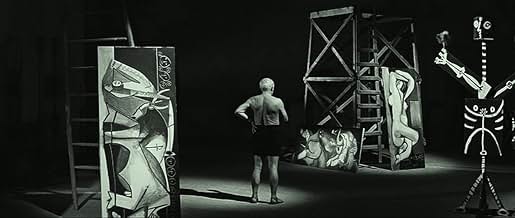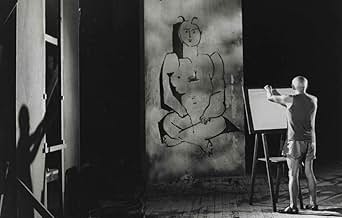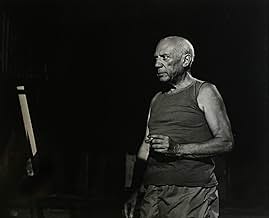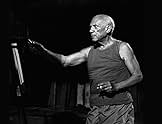IMDb-BEWERTUNG
7,5/10
2856
IHRE BEWERTUNG
Eine filmische Dokumentation über Pablo Picasso, wie er zahlreiche Leinwände für die Kamera bemalt, so dass wir an seinem kreativen Schaffensprozess teilhaben können.Eine filmische Dokumentation über Pablo Picasso, wie er zahlreiche Leinwände für die Kamera bemalt, so dass wir an seinem kreativen Schaffensprozess teilhaben können.Eine filmische Dokumentation über Pablo Picasso, wie er zahlreiche Leinwände für die Kamera bemalt, so dass wir an seinem kreativen Schaffensprozess teilhaben können.
- Regie
- Hauptbesetzung
- Auszeichnungen
- 1 Gewinn & 1 Nominierung insgesamt
Pablo Picasso
- Self
- (as Picasso)
Henri-Georges Clouzot
- Self
- (Nicht genannt)
Claude Renoir
- Self
- (Nicht genannt)
Empfohlene Bewertungen
Henri-Georges Clouzot's The Mystery of Picasso starts by announcing that we will have the pleasure of entering the mind of Pablo Picasso, seeing how he gets his creative inspiration; the film promises us that the only way to do this is to watch Picasso's hand. Picasso paints on paper that the ink bleeds through, putting the camera on the other side of Picasso's canvas and watching the a reversed version painting appear in a seemingly magical way. It becomes clear early on that Clouzot is not wholeheartedly trying to show us how Picasso gets his inspiration; that is a mystery. Clouzot wants to capture the joy of painting. That's what makes this film so entertaining: watching bizarre, beautiful images appear out of nowhere. Sometimes Clouzot uses jump-cuts to show us the different phases of a work in progress at a rapid-fire velocity and then reverses the painting in the same jump-cut technique, deconstructing Picasso's. This is all scored to fiery jazz music. We also see Picasso while painting, as his painting is timed. (Picasso has a great screen presence). Clouzot is equally concerned with deconstructing Picasso's work to understand what makes this fast-working artist tick, showing how impossible that task is, and wowing us all the way through. As far as wowing goes, Clouzot did a pretty good job, with scenes that ranged from unforgettable to pleasantly surprising.
If there was one word to describe this film for me, it would be "inspirational". And I think anyone who practices art or appreciates the process of art, can find this film enjoyable to watch. The film's title speaks for itself. We are engaged in an experimental documentary watching a prodigy at work and trying to unravel the magic of how it all happens. In the beginning there is a voice-over narrated introduction to the film, "Nobody knew what Rimbaud thought of when he wrote the poem "the drunk boat"." And then we realize that we are in for a real treat. Who would ever guess that the master of cubism would allow us to see his creative ideas at work? Most artists are very stubborn about this sort of thing, but then again most famous artists are also pretty ego-centric. The film places the camera behind a canvas that leaves the image transparent so that we can see the painting process without looking over the shoulder. There is a beautiful classical score along with this film and as the drawings progress, Picasso then takes on bigger challenges with paintings. The pacing is just right where the drawing process starts slow and then the strokes become faster with time-lapse photography. There is an amazing moment where the cameraman warns Picasso that he is about to run out of film. Picasso asks how many feet is left and calculates the timing of his painting and just at the last second, Picasso transforms the entire piece into something unexpected and radically different. We can see the spontaneity and playfulness in his work. The end is a mural shaped painting that evolves through many stages until Picasso says something like "its ruined. I have ruined the painting and yet at the same time, its improving." This is an indication of Picasso's fearless drive. When he paints, he is on fire. He works diligently for hours. Its fascinating to see little figures that he will paint over and over with more detail or more color. He wants to emphasize details that seem so ambiguous and its as if he's saying to the audience "look at this" "keep looking at this" "this is important." I first saw this film in the theater when I was about ten or twelve years old. I'm glad my family friends took me to see this. It has inspired me throughout the years. I saw the film again when I was twenty-four and it was just as I remembered it. After it was over, I did the same thing I did when I first saw the film; I pulled out a sketchbook and started drawing. This film is a real treat.
One of the greatest filmmakers of France, Henri-Georges Clouzot, makes a film about his friend Pablo Picasso, perhaps the 20th Century's most renown artist. Clouzot begins with a proposition: if one were present at the conception of a great artistic masterpiece such as Mozart's Jupiter Symphony, and could peek inside the mind of the artist, what would one see? Fortunately, the visual art of painting offers a filmmaker that insight, and so Clouzot begins with Picasso in a dark room with white light directed at an empty canvas. The artist, like a bullfighter, confronts and ultimately displaces the empty space with drama and suspense. Clouzot takes a minimalist approach which chooses to focus on the art rather than the artist, and he achieves this objective by having Picasso sit on one side of a translucent canvas, and the camera on the other capturing only the ink or paint that has been administered, without the distraction or impediment of the artist - pure creation. A window into the mind of the artist! Twenty artworks are created in this manner, each being overlayed with the often suspenseful sounds of Georges Auric's excellent score. With THE MYSTERY OF PICASSO, art becomes exhilarating as one attempts to anticipate what Picasso will do next. "How will he resolve this problem?" Clouzot has created a priceless document for anyone seriously interested in art.
9sol-
A fascinating look at the creative process, filmed in a unique fashion, using a clever technique to capture Picasso's work as he is painting without his hand or his brush getting in the way. This method is actually shown and explained during a live action sequence in the middle. Although the film is mostly just a set of different Picasso paintings in action, interactions between the film's director and Picasso are added in, which not only decreases tedium from the at times monotonous paintwork, but it also makes it a whole lot more interesting, as it feels as if we are there with Clouzot and Picasso in a film studio. The material still becomes a tad repetitive and it tires before the film is over, but set to some great music and actually showing Picasso working through his creative process, this is remarkable, one-of-a-kind film-making and definitely worth checking out.
I received a VHS copy of this film from a friend who was going to trash it. My mother weaned me on trips to art galleries, spoon fed me stories of the personal lives of classic and modern masters, I worked in an art gallery liaisoning with the artists we represented and studied the psychology of creativity in college. This film had me riveted! I felt as though I was invited to eavesdrop, peek in on a great master at work. Every brush stroke was fascinating. I enjoyed the trip Picasso took me on as he started out painting one image and changed it into something else along the way. I enjoyed watching what appeared to be random brush strokes turn into a completed thought. This film helped me feel what it must be like to know when to stop... to know when you have finished a work... when you may have overworked it, when you may not have quite completed. It made me want to paint, not for others but for the simple pleasure one gets from the act of putting pigment on paper. It allowed me to feel free to create without fear of criticism. A must see for all artist and art lovers.
Wusstest du schon
- WissenswertesPablo Picasso is shown creating 20 drawings and paintings from start to finish. He allegedly destroyed these artworks afterwards so they would exist only in the film.
- Zitate
Pablo Picasso: I do not look for, I find!
- VerbindungenFeatured in Picasso (1985)
Top-Auswahl
Melde dich zum Bewerten an und greife auf die Watchlist für personalisierte Empfehlungen zu.
- How long is The Mystery of Picasso?Powered by Alexa
Details
- Erscheinungsdatum
- Herkunftsland
- Sprache
- Auch bekannt als
- The Mystery of Picasso
- Produktionsfirma
- Weitere beteiligte Unternehmen bei IMDbPro anzeigen
Box Office
- Bruttoertrag in den USA und Kanada
- 267.836 $
- Eröffnungswochenende in den USA und in Kanada
- 19.143 $
- 23. Feb. 1986
- Laufzeit
- 1 Std. 18 Min.(78 min)
- Farbe
Zu dieser Seite beitragen
Bearbeitung vorschlagen oder fehlenden Inhalt hinzufügen


